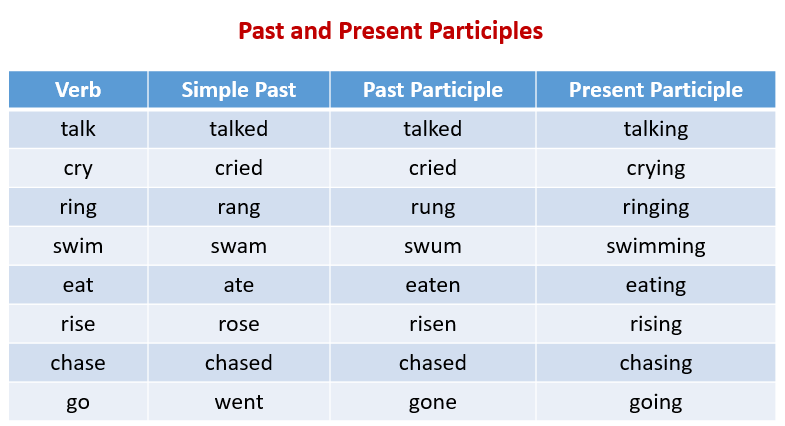What is the past tense of go? This is a reference page for go verb forms in present, past and participle tenses. Find conjugation of go. Check past tense of go here.
Translate go in context and see go definition. Aller in the past tense (passé composé) Aller is one of the verbs that forms the past tense with être. Remember that for feminine forms we add ‘e’ to the end of the past participle allé, and for plural forms we add ‘s’.
Je suis allé au cinema hier soir. It is the only verb that has a suppletive past tense. I hope this helped you out! Which is correct, "Please let me get past, or.
Past Simple: "Alexander went to Denver last week. Past Continuous: "We were going to visit some friends but decided not to go. Past Perfect Continuous: "We had been going to that school for a few weeks when it was chosen as the best school in the city. Depending on how we form the past tense, it might describe actions that happened or were completed in the past, were occurring at the same time as something else in the past, or continued to happen until or near the present time.
The time of the action can be in the recent past or the distant past and action duration is not important. An example of an irregular verb is the following: “I went to my friend’s house for dinner last weekend” ( go —went).
Irregular Past Tense Verbs. Here are some of the irregular past tense verbs that students often have a difficult time with: be.
The word gehen (to go ), one of the most-used verbs in Germany, belongs to the class of strong verbs in German. Also called "irregular strong," these verbs have a vowel change in the simple past and a past participle ending in -en. You already have it in the past tense. Simple present: I go Simple past : I went Perhaps you mean to be asking what the past participle is.

Now that we’ve clarified that – let’s go deep on knowing when to use each past tense in Spanish. Present tense verbs take place in the present, and future tense verbs take place in the future.
They can be regular verbs that simply end with a "d" or an "ed" or they can be irregular and change their spelling to show the past tense. Past tense verbs refer to actions or events in the past. It can be used for politeness, to talk about the past or talk about something we have imagined.
Let us understand more about each of these groups of tenses. This tense is used to refer to something that happened in the past. Sometimes, past tense is also called as ‘simple past tense ’. Example: We stayed in a hotel. If you're still trying to get a grasp of these two verb forms, never fear.
Read this to learn the differences, how they're use and how to form each. One can check verbs forms in different tenses. Use our search box to check present tense, present participle tense, past tense and past participle tense of desired verb.
The second column is the simple past tense. The third column is the past participle, which is combined with has (singular) or have (plural) to form the present perfect tense. English grammar subjects. I was not tired this morning.

Passed is a verb (usually). We passed the mall on the way to the store. You should go ahead and pass the slow car.
Hiç yorum yok:
Yorum Gönder
Not: Yalnızca bu blogun üyesi yorum gönderebilir.